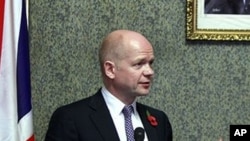Britain's Foreign Office says arms sales to Bahrain are under urgent review following violence in the Gulf state. Human rights groups have criticized Britain for licensing the sale of tear gas and other riot control equipment to the country.
The foreign office says hundreds of cartridges of tear gas and other riot equipment have been licensed for sale to Bahrain within the past nine months.
Speaking to the BBC on Friday, Foreign Secretary William Hague said a review is under way on future arms exports to the country.
But he said Britain already has one of the most strict export criteria in the world.
"We do not sell material to other countries that are materials that are likely to be used for internal repression or to fuel regional or international conflicts and we strictly apply those criteria," said Hague.
Bahrain is one of a number of Arab countries that have been rocked by popular protest in recent months. In two countries, Tunisia and Egypt, the leadership has been ousted.
At least five people were killed during clashes in Bahrain on Thursday and during their funeral on Friday mourners called for the overthrow of the ruling family.
Britain has a long history of close ties with Bahrain. During the colonial era Bahrain was the center of Britain’s imperial administration and Bahrain only gained its independence forty years ago.
Now that close relationship has come under the spotlight.
The non-governmental organization Campaign Against the Arm Trade says Britain, by selling arms to Bahrain, has provided an authoritarian regime with the tools of repression.
Jane Kinninmont is a Bahrain expert with the London-based research group Chatham House. She says Britain and the United States are major suppliers of arms to Bahrain.
"The majority of arms sales to the Gulf countries are weapons for external use so I don't think that internal repression is actually the main driver of the arms sales," said Kinninmont.
She says a reform program that was launched in Bahrain ten years ago has largely failed and Bahrain’s western allies have not put enough pressure on the leadership.
"I've often heard Bahrainis criticize the UK and the US for not doing more on issues of democracy and human rights," she said. "The reform process really has stalled over the last five years. In the last year you could really say that some of the reforms have been reversed. But the US and the UK have simply continued to praise Bahrain as a reformer without really addressing some of these concerns."
Speaking Friday, British Foreign Secretary Hague said Bahrain’s government should have a dialogue with the opposition and that dialogue should lead to reform.




